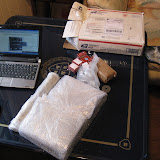8/27/10
8/26/10
8/25/10
Just joined R bloggers (http://www.r-bloggers.com/). I'm using R to write G-code for the milling maching. This evening (10/25/2010), I'll give a talk on this at the DC-area UseR meetup. Here's a link to the presentation: http://files.meetup.com/1503964/Using%20R%20to%20Cut%20Triangles.pdf
2/11/10
 2/10/2010 - After hours and hours of programming and trial runs, I've cut my first triangle and it looks great.
2/10/2010 - After hours and hours of programming and trial runs, I've cut my first triangle and it looks great. The plot below and to the right shows the first triangle. The small dots are vertices of all 100 triangles. The plot shows the original coordinates (rightmost of the triangles). Next, it is moved so the rightmost vertex is at (0,0). Then it is rotated counterclockwise so that the first cut is horizontal (from 0,0 to about -80,0). Finally, allowance is made for the cutting tool's radius. The green lines mark where the tool's center will travel when cutting the three edges.
To view the intermediate steps, click on the link below.
1/30/10

1/30/2010 - Milling, at last!
After hours and hours of coding, I had a program that would carve a brief message into a block of wood. There are still some programming issues.
I now understand that the software has two ways of interpreting an arc command. For example, "G2 X3 Y3 I0 J1 could be interpreted as "move clockwise to location (3,3) (x=3 y=3) with the center of the circle at coordinates (0,1)" OR it could mean "move clockwise to location (3,3) with a center that at (3-0,3-1)=(3,2)." The center, of course, can make a big difference!
Right now, I'm using the mill to cut a 25mm diameter hole in 3/8" PVC. This is part of a bracket that is needed to better-hold the carving tool. With only one bracket, the tool is held too loosely and moves a bit when it is cutting.
Here is a movie of the mill and the software doing their job. This is taking a while, because I don't want to put much stress on the single bracket. The tool is moving at a rate of 10mm/min. One trip around the 25mm circle takes about 25*pi/10 = 8 minutes.
1/17/10
January 17, 2010
Today, I learned to solder. There were quite a few wires to solder. Each axis has two emergency stop switches, and each of these had at least two wires. I also put in a panic button. If things go bad, all I need to do is push the panic button to cut off the mill's DC power.
With all the stops wired and in place, I ran each axis until it triggered its stop. It worked! The motors each stopped running. I could no longer move them through the software, but I could turn the screws by hand - but only a few turns until the switches clicked off and the controller locked the motors in place. Turns out these positions (smidgens away from triggering the emergency stop switches) were excellent choices for the axis zero settings.
The other thing I learned today was how to write the control code, called G-code. It was very cool to write a line of code, send it to the controller, and see the machine behave exactly as expected.
1/16/10
Getting Started
December 25, 2009 - Thank you Sally and Benn for giving me the CNC mill! I managed to assemble the mill and it looks pretty good. The image below is a link to photos of the mill in different stages of development:
 |
| CNC |
Up to now, I kept a log in an old-fashioned notebook. For completeness, I'm entering that info here. What follows are notes from the logbook:
January 4, 2010 -
- Placed order with Jameco for a Transformer (part 123450, catalog 82368). This will be the mill's power supply at 24 VDC.
- Placed order with www.easy-cnc.com for 3-axis driver, 2.5 A per axis.
- Ordered PVC sheets from freckleface.com.
- May use sheets in 3-D sculpture project. Here's a link to my patent application for the sculpting process.
- Added felt footer to the base of the mill
- Need serial mouse to get the old computer running. Oops - the computer only has windows 98. Need machine with XP.
- Checked stepper motors to identify which wires to use. Middle of each set of 3 is the common, so isolated those, as they won't be needed.
- Ordered from Winford Engineering: DIN Rail, Black and Gray mounting clips, DB25 breakout board.
- The breakout board will allow me to signal the controller from basic stamps
- The other stuff will help me keep everything organized - mounted to wall or inside a cabinet.
- Purchased PC and wireless USB from MicroCenter. This machine will be dedicated to the mill.
- Downloaded limited version of Mach 3 software.
- Mach 3 driver test - success at 25 khz!
- Configured Mach 3 Mill - The Mill is actually working now! Need to make a movie.
- Installed Open Office and Google Chrome
- Installed R and Tinn-R
Subscribe to:
Posts (Atom)




